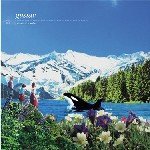
Gustav Rettet Die Wale
(Mosz Records / These Records)
This début album is no. 005 in the Mosz catalogue - a new Austrian label founded in 2003 to be 'located at the borderline between analogue and digital concepts in music' - and it's all that an indie should be: edgy, abrasive, a bit careless, a bit rough at the edges, but with a fragile heart and a questing soul and a keen spirit that's forged, Blake-like, in some fiercely passionate blast-furnace of indignant wrath - bring on that chariot of fire, indeed! - manifest in a nine-track album that jumps at you like a besotted puppy and defies you not to be utterly seduced by its wayward winsome puppiness.
I've mentioned before a rather cool tendency amongst singer-songwriters to being modest with their real names: Badly Drawn Boy, The Album Leaf, Gravenhurst, Lali Puna, to name but a dozen. Gustav, similarly, is not the square-shouldered son of a Viennese butcher that you might imagine, but rather a floppy-maned fräulein from Graz called Eva Jantschitsch, a one-woman band seemingly capable of playing anything that makes a noise. She's also (sensible girl) plugged into a local network of willing and talented collaborators whom she can call on when living-room mixing gets lonely, and - last but far from least - she has a wicked way with words and the vocal wherewithal to deliver them - a disarmingly frail voice with an affecting quiver in it that has hidden reserves capable of punching holes in concrete.
Sung half in German and half in English, this is a cabaret collection for the twenty-noughts. It's a restless, keep-up-or-die album. At times, in songs like little weird grrrl and da, am monopØl, the music becomes quite joyously abandoned to kick-ass buzzrock, all flailing arms and legs, whereas at others, such as in mein bruder, it bespeaks a sort of portentous psychosis - the twitchy articulation of hearing things that go bump in the night. I get the distinct whiff of Brecht-Weillian cigar smoke coiling in the background - the pervasive irony, right now, of looking back to that determination to keep on singing in defiance at the looming deathhead rictus of fascism. A nod, too, I think, at Wolf Biermann. Yes - (hush) - political and proud. A bit of an absence of that in the music world lately. Begrüßen Sie, Kamerad! But it's a politics not so much polemical as allusory, so that, for instance, an exquisitely beautiful love song - Genua - unfolds like the fragilest spindrift from the unlikeliest of materials - a post-G4-summit-demo tryst beneath a pier by the lake - into a tender revolutionary ballad that even manages to reference Paris '68 - remember 'Sous les pavés, la plage'? - in a neat trick of poetics: 'lass uns strand finden/unter dem pflaster der revolution' ('let's find a beach/beneath the plaster of revolution').
Several of these songs - little weird grrrl, one hand mona, mein bruder - are vignettes from either a feverishly baroque imagination or a life lived slightly at an angle - probably both: they're at once amusing, entertaining, compelling, ironic, and rather scary. Life as a ride on the ghost-train. And the title-song (in this case the finale, which makes sense once you begin to understand what Gustav is about) is just a list of simple recommendations for a better life - 'rettet die wale und stürtz das system...macht liebe jeden tag...' ('save the whale and trash the system... make love every day...') sung straight over a lilting palm court orchestra that's playing a rather pleasant foxtrot with no electronics embellishment whatsoever: as the spotlight finally irises out one's left with the eidetic image of a tiny figure front and centre beneath the enormous gilded plaster proscenium arch of some flaky dance hall that's seen better days (I get the Blackpool Tower Ballroom out of season but each to her own).
A kind of bastard child of Björk and Billy Bragg, Gustav is exactly the kind of musician that's going to be needed over the next four years - impassioned, uncompromising, intelligent, and honest, with a backpack full of rocks and bandages - someone to hold your hand as you prepare to plunge into this dreadful dark tunnel and divert you, at least for the moment, with comforting gothic intimations of solidarity.
7 January, 2005 - 00:00 — Paul Roylance